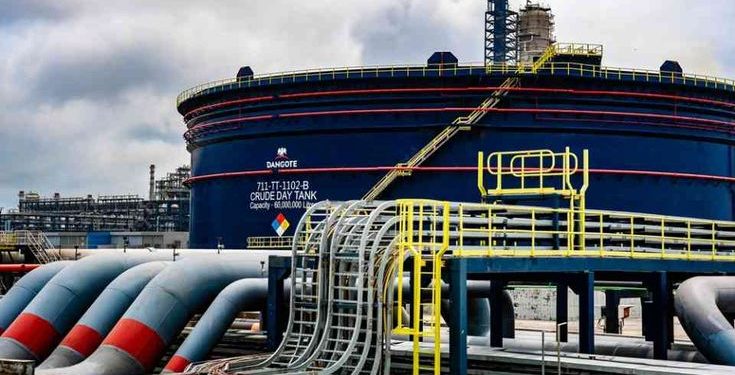The Federal Government has successfully brokered a truce between Dangote Refinery and the Petroleum and Natural Gas Senior Staff Association of Nigeria (PENGASSAN), bringing an end to a nationwide strike that threatened to cripple Nigeria’s oil and gas industry.
The resolution followed two tense days of high-level negotiations involving government ministers, security chiefs, and representatives of both Dangote Group and PENGASSAN. The outcome has been hailed as a victory for workers’ rights and a demonstration of the government’s ability to intervene decisively in industrial disputes with major economic implications.
How the Crisis Started
The impasse was triggered when Dangote Refinery reportedly dismissed over 800 workers, many of whom were active members of PENGASSAN. The union claimed the mass sackings were directly linked to unionisation efforts, accusing the company of attempting to suppress labour representation.
PENGASSAN further alleged that the refinery was increasingly relying on foreign workers to replace Nigerians, calling the action discriminatory and exploitative. In response, the union escalated its protest by halting crude oil and gas supply to Dangote Refinery.
The situation worsened when PENGASSAN declared a nationwide strike, shutting down operations in key government institutions including the Nigerian National Petroleum Company Limited (NNPCL), the Nigerian Midstream and Downstream Petroleum Regulatory Authority (NMDPRA), and the Nigerian Upstream Petroleum Regulatory Commission (NUPRC). The strike sparked fears of widespread fuel shortages, economic dislocation, and further inflationary pressures at a time when the country’s economy was already under strain.
Dangote Group, on its part, defended the dismissals, insisting that they were not punitive but part of a broader restructuring exercise aimed at improving efficiency and addressing security concerns such as internal sabotage. The company maintained that it was within its rights to reorganise its workforce.
Government Steps In
Recognising the magnitude of the crisis, the Federal Government quickly intervened. The Minister of Labour and Employment, Mohammed Dingyadi, convened initial peace talks on September 29. However, the discussions soon hit a deadlock, prompting a relocation of negotiations to the Office of the National Security Adviser on September 30.
What followed was an unusually broad government involvement. The peace talks expanded to include Wale Edun, Minister of Finance and Coordinating Minister of the Economy, Atiku Bagudu, Minister of Budget and Economic Planning, Mohammed Dingyadi, Minister of Labour and Employment, the National Security Adviser, the heads of the Department of State Services and the National Intelligence Agency, as well as the chief executives of the NNPCL, NMDPRA, and NUPRC.
The presence of the Finance Minister and other top economic officials highlighted the far-reaching consequences of the dispute. A prolonged shutdown of Dangote Refinery, Africa’s largest single-train refinery, would have threatened Nigeria’s fuel supply, forex reserves, and investor confidence.
Terms of the Agreement
After marathon deliberations, both parties agreed to a framework designed to restore peace and stability.
Dangote Group committed to reabsorbing the disengaged staff into other subsidiaries of the conglomerate without any reduction in salaries or entitlements. Both sides affirmed that no worker would be punished for their role in the dispute or for exercising their right to unionise. The Federal Government also reaffirmed that unionisation is a lawful right of Nigerian workers, and no company operating in the country can infringe on that right.
In light of these commitments, PENGASSAN agreed to begin the process of officially calling off the strike and returning its members to work. Minister Dingyadi, who read the communiqué on behalf of the government, stressed that the resolution was reached in good faith and must be implemented in full.
Relief Across the Country
The decision brought immediate relief to Nigerians, who had begun to worry about potential shortages of petrol, diesel, and aviation fuel. The resumption of normal operations in oil and gas facilities nationwide is expected to restore confidence in energy supply and calm the markets.
Union leaders described the truce as a victory for workers, pointing to the reinstatement of staff and recognition of union rights as major concessions. For Dangote Group, the settlement was a way to avert a drawn-out crisis that could have stalled refinery operations and damaged its reputation globally.
Questions That Remain
Despite the celebratory tone, observers note that the resolution raises important questions.
How quickly will Dangote Group redeploy the affected workers, and will the process be transparent? Will the company uphold its promises on union rights, or will tensions resurface later? Could this case embolden unions in other large private firms to push more aggressively for labour rights? And what steps will government take to ensure that such disruptions, which nearly paralysed the petroleum sector, are avoided in the future?
A Turning Point
The Federal Government’s intervention, marked by the unusual involvement of the Minister of Finance and other key economic figures, highlights the delicate balance between industrial relations and national economic security.
While the truce has temporarily restored peace, the true test lies in whether Dangote Group follows through with its commitments and whether government monitoring will be robust enough to enforce compliance.
If implemented faithfully, the settlement could mark a turning point in Nigeria’s labour relations, demonstrating that even the country’s biggest corporations must respect workers’ rights. But if mishandled, it could set the stage for deeper distrust between labour unions and private investors.
For now, the strike is off, the refinery is back in operation, and Nigerians are watching closely to see whether this fragile peace will hold.
























































